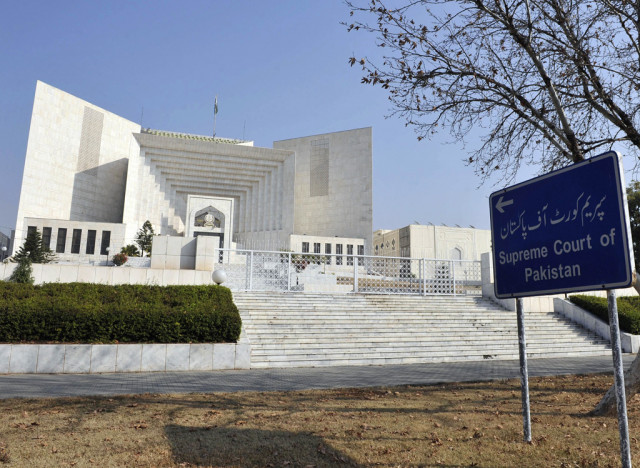CJ constitutes seven-member bench to hear PM's disqualification case
The case is expected to be affixed for hearing in next ten days

Confirming to The Express Tribune that a larger bench has been constituted, a Supreme Court official said, "although a date for hearing has not been fixed, but it is expected that a date will be set in the next ten days."
The larger bench will adjudicate questions raised by the three-member bench in its four page written order on a petition filed by Insaaf Lawyers wing’s senior vice president Gohar Nawaz Sindhu’s against the Lahore High Court’s September 2, 2014 order to reject his writ petition.
Earlier, while hearing the prime minister disqualification case in Quetta on November 10, Justice Khawaja had ordered the office to place the case file before the chief justice, who may constitute the larger bench if they considered it appropriate.
The court also suggested that senior advocates of the bar – Hamid Khan, Raza Rabbani and Khawaja Haris – assist the court as amicus curiae since important constitutional questions involving continuity and the health of country’s system of elections, governance and adherence to the will of the people have arisen.
The bench had also formulated a number of questions for considerations with an emphasis to lay down a law suggesting what should be the minimum threshold for attracting Articles 62(1 f) and 63(1 g) of the constitution requiring a conviction by a court against a member of the parliament.
It is important to determine, the bench said, which court is competent to convict a parliamentarian besides what should be the standard of proof required for making such conviction.
The court had also suggested for the consideration of the larger bench to define the term “sadiq” and “amin”, which is a constitutional pre-requisite for any person to be eligible to be elected as a member of parliament. The apex court said that these terms have to be interpreted as they constitute a substantive part of the constitution and it was the people of Pakistan who have, through the constitution, mandated and were entitled to ensure that members of parliament elected by them fulfill the eligibility criteria and qualifications given in Articles 62 and 63 of the constitution.
The larger bench will also consider whether Article 66 (privileges of members) provides an absolute or a qualified privilege to parliamentarian for statements made on the floor of the two houses of parliament and provincial assemblies and also whether the provisions of Articles 62 and 63 override Article 66.
Further, it will determine what material changes have been made in Articles 62 and 63 by virtue of the 18th amendment passed in April, 2010.
The bench had held that it was of utmost importance that these questions be adjudicated because the challenges as to qualifications or disqualifications, eligibility of elected members and also elections and by-elections were a recurring phenomenon and for the same reason it is necessary that courts, returning officers and election tribunals receive guidelines.
Otherwise there is likelihood of lack of uniformity in the decisions by different courts, returning officers and election tribunals, as there are a total of 1,070 constituencies and an average of 10 candidates will be contesting elections and will be submitting their nomination papers for scrutiny.
The bench while issuing four page written order has observed that facts and circumstances emerging on record may prima facie not justify the acceptance of the writ petition, seeking disqualification of prime minister.
“It may well be that facts and circumstances emerging on record may prima facie not justify the acceptance of the writ petition, but it is in our view still essential to lay down the law ad parameters of the constitutional provisions and to outline on principle what would be the minimum threshold for attracting the provisions of the constitution,” the written order stated.
“It is the people of Pakistan who have (through the constitution) mandated and are entitled to ensure that members of parliament elected by them are inter alia, “honest and amen” and thus fulfill the eligibility criteria and qualifications given in Articles 62 and 63 of the constitution,” the order adds.



















COMMENTS
Comments are moderated and generally will be posted if they are on-topic and not abusive.
For more information, please see our Comments FAQ